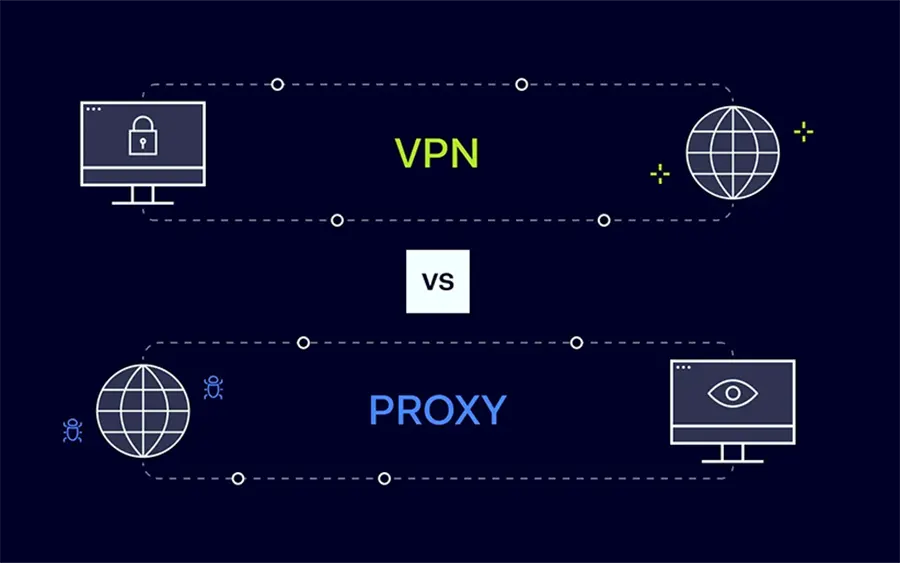For many users, connecting to the internet via a proxy or a VPN is one of the best options. The main advantages of this approach are anonymity and additional protection of personal data. When facing regional restrictions or limits on using multiple accounts, proxies and VPNs make it possible to circumvent these bans.
Such methods of connecting to the network replace your real IP address with a virtual one located on a remote computer. As a result, servers on the internet receive substituted information about network settings and users. However, there are certain differences between connecting via a proxy and using a VPN.
What Makes a Proxy Different From a VPN?
Proxy Features
Technically, a proxy is a server physically located on a remote site in any country around the world. Its purpose is to act as an intermediary between the client’s computer or tablet and the end resource on the internet. User requests are transmitted through the proxy, which changes the real IP address and network settings.
Every user gets a dedicated IP, allowing for anonymity and the ability to bypass current blocks. If you plan to use specialized software for multi-account operations, this approach helps avoid being banned on websites.
Key aspects of connecting via a proxy server include:
- No Special Software Required: Configuring your computer does not require installing any additional programs. Every operating system already supports this.
- Connection Credentials: To connect through a proxy, the user needs the server’s IP address, port, login, and password.
- Flexible Options: Several connection modes are available. You can opt out of anonymous connections, or you can hide and encrypt personal data.
- Performance: Proxy connections are stable and often deliver high-speed data transfers because each user is assigned an individual IP.
- Wide Range of Services: Numerous proxies exist, both paid and free. Affordable plans for high-quality proxies are accessible to any customer.
- Customization: You can configure the server to meet individual preferences and requirements, with many options available.
A potential downside of using proxy servers is that connection speed depends on the physical distance of the equipment’s location. When choosing a proxy, geolocation is crucial. Quickly switching to another country is also more complicated, as you need to rent a different proxy for that.
VPN Features
VPN stands for “Virtual Private Network,” which runs on top of an existing connection. A key characteristic of a VPN is that it encrypts data packets and sends them to a server in the network in an encrypted form. Even a provider’s technical resources cannot decrypt the message. As a result, the user’s IP address and network settings remain anonymous.
Key aspects of using a VPN include:
- Shared IP: When connecting this way, all users share the same IP, which can be relatively easy to detect technically.
- Best for Simple Surfing: A VPN is great for anonymous browsing, but it’s not as suitable for multi-account tasks or specialized software.
- Easy Setup: You can configure a VPN by installing additional browser extensions. Connection is straightforward, and you can quickly change countries based on regional settings.
- Higher Cost: Buying a VPN can be expensive—more costly than renting a proxy server.
- Reduced Speed: Because data packets are encrypted, the connection may slow down.
Users who choose to run a VPN often experience typical problems such as connection failures, the need to restart the browser or app repeatedly, and overall instability. One of the main issues with a VPN is unstable connectivity.
Main Differences
When selecting a method for connecting to online resources, it’s crucial to understand how a VPN and a proxy work. A VPN routes your traffic through a virtual network, while using a proxy involves renting an IP address from an external server. Though both methods share the goal of anonymity and bypassing restrictions, proxies cost less, offer more functions, and can solve a broader range of tasks.
Ultimately, the choice depends on each user’s needs. However, more and more people are opting for proxies due to their clear advantages and wide range of features. Free servers are available for testing, and if you plan to use a proxy constantly, it’s worth choosing a paid service.
Our website features the best active proxy servers on the internet. Each user can compare services by their ranking, pricing plans, and conditions, and make use of a trial period. The choice of the best proxy is up to you—our service will help you find it.
